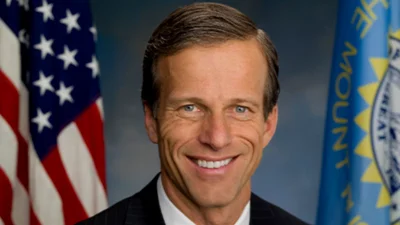The publication is reproduced in full below:
Biden Administration
Mrs. CAPITO. Madam President, I rise today really to take a moment and evaluate the repeated and unfortunately habitual overreach of the Biden administration.
When our Founding Fathers established our Nation, they were certain to build a government that rejected undivided sovereignty, or the rule of a single person. They had the monarchy, and they didn't like it. This structure features three distinct branches of government: the legislative branch, where we are here, to create and pass laws; an executive branch, responsible for enforcing the laws; and a judicial branch to make certain these laws and actions hold just with our Constitution.
Typically, this is a lesson we all learn in high school, but it seems like President Biden and his administration must have missed that lecture on balance of powers because their actions throughout the last 2 years have shown a lot of disrespect for our Constitution--and disregard.
A recent analysis by the American Action Forum found that in just 2 years, the Biden administration has imposed 517 regulatory actions--
517--creating $318 billion in total costs--a figure that massively outweighs the regulatory costs generated by the last two Presidential administrations.
Executive overreach has become synonymous with the Biden administration and has created a desperate need for oversight from our Republican colleagues here in the Senate, and certainly that is occurring across the way in the House of Representatives.
We have seen overreach from the Biden administration in areas that impact just about everything, whether it is how we heat our homes or whether we are going to have a gas stove or not, how we fuel our cars, how we educate our children, how we move goods across the country, how we spend private investments, how we enforce law and order, even how we define ``water.''
Plain and simple, President Biden and unelected bureaucrats in Washington are continuously overstepping their boundaries, creating hurdles and interfering with how we live our everyday lives.
On top of this, congressional Democrats continue to obstruct critical oversight efforts on these harmful policies, and they are blocking opportunities for the American people to hear directly from the administration about policies that impact us directly every day. It is kind of--it is not ``kind of''--it is very unfair, and it is a disservice to folks across the Nation who want the leaders to be held accountable.
In the face of such rampant overreach, my Senate Republican colleagues and I continue to push back on President Biden's out-of-
touch mandates and bring the voices of the American people to the table.
My colleague from Tennessee, Senator Bill Hagerty, has introduced a bill that blocks Washington, DC's dangerous and irresponsible rewrite of their Criminal Code that lessens punishment for violent crimes.
My colleague from South Dakota, Senator John Thune, has introduced a bill to prohibit the President from canceling outstanding Federal student loan obligations due to a national emergency.
Another tool at our behest against this unprecedented expansion of the administrative state is called the Congressional Review Act of disapproval. It sounds kind of bureaucratic, and it is, but it can be very, very meaningful.
As you know, through a Congressional Review Act of Disapproval, or CRA, Congress can vote to overturn rules from the executive branch that are classified as overreach. My colleague from Indiana, Senator Mike Braun, has introduced a CRA that would block a recent Department of Labor rule allowing retirement plan fiduciaries to consider climate change and other ESG--or environment, social, and governance--factors in their investment decisions. I don't know about you, but I think most people who are retired or beginning to retire and looking at their accounts that they are going to be living on, they would rather see the returns come in the most profitable way possible so that they can live out their life. In the end, that is better for all of us.
This effort would nullify the Department of Labor rule and prevent similar rules from taking effect. Actions like these have direct impact on energy-producing States like mine by steering capital away from the American energy sector. We should be investing in our American energy sector.
I, too, have introduced my own CRA in response to a repeated overreach from the Biden administration. Last December, the Biden administration launched its latest round of regulatory overreach through the waters of the United States, which we refer to here as the WOTUS rule. It marked the third major change to the definition of what waters are in this country and which ones are subject to Federal jurisdiction. It is the third time this has changed over the last 8 years. Think about if you are in agriculture or if you are in construction--big impacts.
Like many regulations from this administration, it is very overreaching. It is misguided, and it is just not necessary. Even worse, it places an undue burden of uncertainty directly on America's farmers, on America's ranchers, on America's miners, on America's infrastructure builders, and, quite simply, American landowners.
The Biden WOTUS rule repeals the 2020 Navigable Waters Protection Rule that provided predictability and certainty and protected our waters. Most importantly, it properly implemented the Clean Water Act by protecting our waterways through coordination and cooperation from States and the Federal Government.
You may hear that without this new definition, some waters may go
``unprotected.'' That is not true. It is an insult to our State officials who know their local ecosystems and have jurisdiction over their territorial waters.
So what does the new definition really do? It requires more people to get more permits who can't get permits, and it causes fear of EPA enforcement actions and frivolous lawsuits from environmental groups.
This all comes at a time when we should be streamlining our Nation's permitting and review process. Instead, the administration is using their classic overreach tactics to make more projects subject to Federal permitting requirements and add more bureaucratic redtape.
My CRA gives every Member of Congress the chance to stand with our farmers, our ranchers, our landowners, our miners, and our builders. It is also a chance for us to protect future transportation, infrastructure, and energy projects all across the country.
For this particular rule, CRA, we have seen widespread support both in the House and the Senate in an effort to overturn this rule, and I look forward to having that here on the Senate floor.
As ranking member of the EPW Committee, I have made it a priority to ensure that the historic investments that we have made in infrastructure are being implemented as Congress intended.
The Infrastructure Investment and Jobs Act--we call it here IIJA; we have an acronym for everything--that we passed in 2021 and the President signed will benefit all communities by providing our States with the flexibility needed to upgrade, expand, or modernize our Nation's core transportation infrastructure. That is why ensuring that the letter of the law is followed, as we intended it, will be and has continued to be a high priority for me. We do not want to miss this moment.
That being said, the Federal Highway Administration, or FHWA, released a memo a little over a year ago in December that found its way into numerous guidance documents attempting to enact a wish list of policies we--when I say ``we,'' I mean the bipartisan EPW Committee--
intentionally negotiated out of the final law.
I, along with the House Transportation and Infrastructure Committee chair, Sam Graves, had announced our intention to formally challenge this rule. The FHWA heard what we were saying and also heard what their State transportation folks were saying. So just last Friday, FHWA released a substantially revised replacement, reversing course from that December 2021 memo.
The new memo removes the policies that Congress rejected--because it is not administrative policy, it is congressional law--and issued a revised memo. And the administration basically admitted that they were wrong in their attempts to undo the flexibility provided to States in the law by establishing preferences for certain policies. Building highways, maintaining highways, creating bypasses, however you want to do your State--it is different in Nevada; it is different in Indiana; it is different in West Virginia--we need to give our States the flexibility.
This is a good example, I think, of the Biden administration knowing they were overreaching, and they actually corrected that. I am grateful for that.
As my colleagues and I highlight the continuous level of overreach this administration has grown comfortable with, I would suggest that the President reference a U.S. history book and leave the legislating to the legislators. Until then, my colleagues and I will continue to stand for the way of life outside the beltway and provide solutions that strengthen our families and communities instead of having setbacks.
With that, I yield the floor.
I see my fellow Member of the Senate from Indiana, Senator Braun, is here to talk on this topic.
Thanks for coming.
The PRESIDING OFFICER. The Senator from Indiana.
SOURCE: Congressional Record Vol. 169, No. 39
The Congressional Record is a unique source of public documentation. It started in 1873, documenting nearly all the major and minor policies being discussed and debated.
Senators' salaries are historically higher than the median US income.



 Alerts Sign-up
Alerts Sign-up